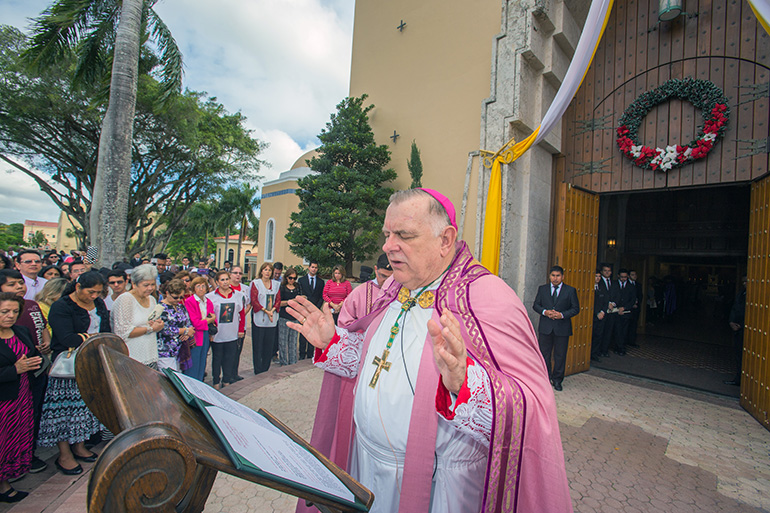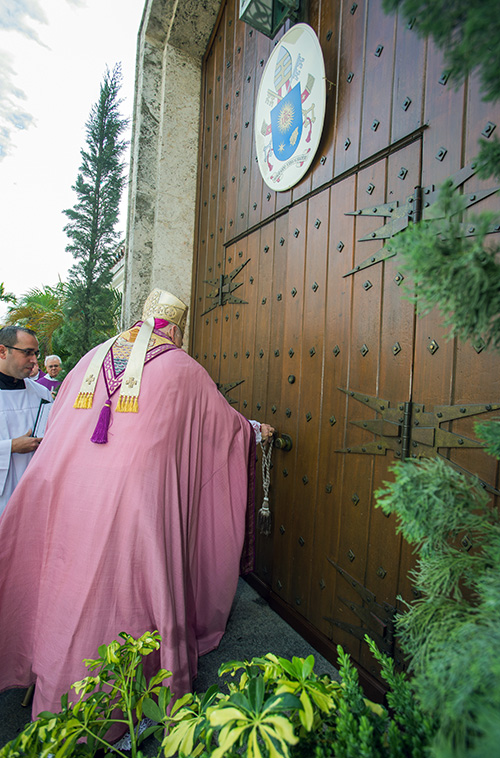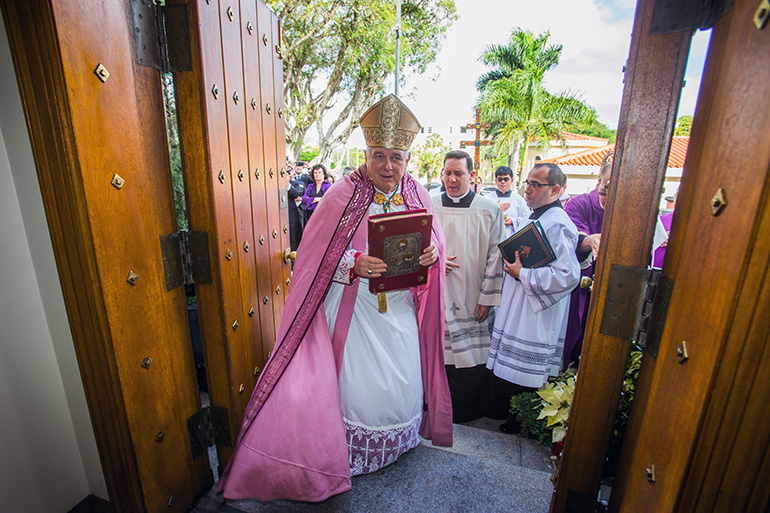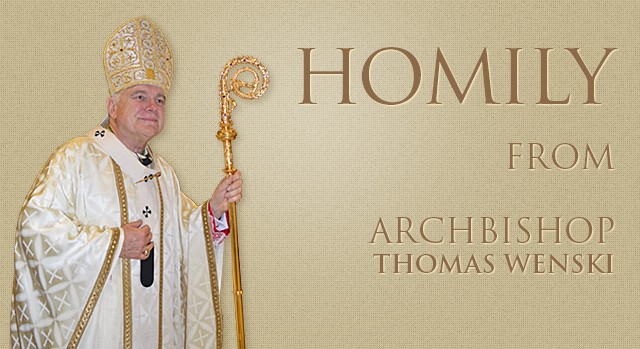By Archbishop Thomas Wenski - The Archdiocese of Miami

Photographer: MARLENE QUARONI | FC
Archbishop Thomas Wenski prays before procession to the Holy Door.
Archbishop Thomas Wenski preached this homily Dec. 13, 2015, during the Mass where he opened the Holy Door for the Year of Mercy at St. Mary Cathedral.
Last Tuesday, the feast of the Immaculate Conception, marked the 50th anniversary of the conclusion of the Second Vatican Council, and the beginning in Rome of an extraordinary Jubilee Year of Mercy. Today, with the opening of the “Holy Doors” here and in five other churches here in the Archdiocese of Miami, we too have entered into this Holy Year. That we do so on this the Third Sunday of Advent, Gaudete Sunday, is not insignificant.

Photographer: MARLENE QUARONI | FC
Archbishop Thomas Wenski opens the Holy Door at the northwest entrance to St. Mary Cathedral.
Today, midway through Advent, the Liturgy exhorts us to “Rejoice” � we rejoice because the Lord is near. On Divine Mercy Sunday, the pope explained his reasons for convoking this Holy Year. He said: “Why a Jubilee of Mercy today? Simply because the Church, in this time of great historical change, is called to offer more evident signs of God’s presence and closeness.”
We are in fact living in a time of great historical change � and we all can applaud much of what that change has brought us. Nobody would want to give up their smart phones or any other of the conveniences of modern life. Yet, we are beset by great challenges. And it is not difficult to recite a litany of woes that not only frighten us but leave us feeling helpless and powerless. The world is at war: we struggle for peace � among nations, among ethnic groups, peace at home and peace between two civilizations � the Muslim world and the Western world. We have issues that affect each of us � the crisis in the family, economic and social inequalities, a 40-year-old drug epidemic fueled by a co-dependency, a mutual addiction between the greed for money and the need for drugs.
Our problems seem so big � and before them, we seem so small, so insignificant. Pope Francis is right. The Church, whose mission is always to proclaim the “Joy of the Gospel,” is “called to offer more evident signs of God’s presence and closeness.” In today’s liturgy, the readings all proclaim to us, “the Lord is near.” If the Lord is near, then this is not a time to vacillate between fear and hope. Advent � with its call to repentance and a change of heart in advance of the Lord’s coming � is a time for us to clean up our act. So just like those who heard the preaching of John the Baptist, we too must ask, “What must we do?”
John the Baptist’s answer was to challenge people’s generosity and sense of fairness so that others may have reason to rejoice. Give bread to the hungry and clothes to those who have none. To tax collectors, to soldiers who provide the muscle to the tax collectors, he tells them to stop stealing from the poor and weak and to be happy in doing what is just.
In convoking this Jubilee Year of Mercy, Pope Francis also wants to help us answer that question, “What we should do?” Because many see the Church as somewhat of a scold, Pope Francis reminds us: “The Church’s first duty is not to hand down condemnations or anathemas but to proclaim God’s mercy, to call to conversion and to lead men and women to salvation in the Lord.”
This doesn’t mean that the Year of Mercy should be some sort of “get out of jail free card” that dispenses “cheap grace.” Cheap grace would be the preaching of forgiveness without requiring repentance, baptism without discipline, Communion without confession or absolution without personal conversion.
This Holy Year of Mercy is not about denying sin or the seriousness of its consequences. If there is no such thing as sin then mercy is just a rather empty and shallow sentimentality. Mercy, to be mercy, must always be “love in truth.” But the Holy Year of Mercy is about reminding us that God’s mercy is always greater than our sins. Christians are not perfect � just forgiven. Thus, we refuse to define ourselves by our sins; and because we have experienced God’s mercy, we are not to define others by their sins.
And as John told his listeners to feed the hungry and clothe the naked, during this Year of Mercy, we both as individuals and as a Catholic community, are encouraged to perform more intentionally the Corporal and Spiritual Works of Mercy.
Throughout the Gospel, we see how Jesus transformed people � through mercy. Mercy transformed Matthew, the one-time tax-collector; his mercy transformed the woman caught in adultery. Mercy transformed Zacchaeus. Mercy transformed the Samaritan woman at the well. At this time, as the pope said, of great historical change, the Year of Mercy is likewise an invitation to each of us to allow that mercy to transform us and our world.
The Advent Season tells us that God is near. The Holy Year of Mercy is an invitation to all to experience God’s presence and closeness in their lives. As someone once said, “Every saint has a past and every sinner has a future.” Mercy opens that future to us.
Gaudete! Rejoice!

Photographer: MARLENE QUARONI | FC
Archbishop Thomas Wenski enters through the Holy Door at St. Mary Cathedral.

